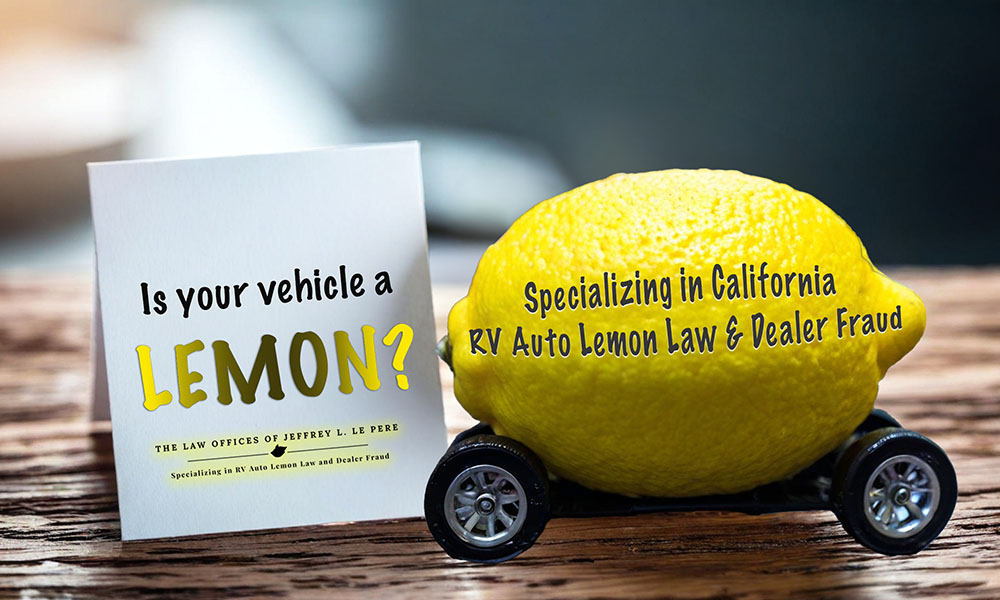What RV, Used Car, and Truck Owners Need to Know About SB 766

California has enacted one of the most significant consumer protection laws in recent years, which safeguards vehicle buyers in the sate — Senate Bill 766, signed by Governor Gavin Newsom on October 7. It will take effect on October 1, 2026.
This sweeping law creates new rights for buyers of used cars and trucks while also signaling a shift toward greater fairness and transparency in all vehicle sales. Even though the statute primarily targets the car market, its principles of honest pricing, full disclosure, and fair treatment are just as relevant to RV owners and those purchasing heavy-duty trucks or motorhomes.
If you’re purchasing a used car, truck, or RV in California, SB 766 brings significant changes and gives consumers greater leverage than before.
5 Key Changes Under California’s New Law (SB 766)
Under the California CARS Act (California Combating Auto Retail Scams; SB 766), car dealers will be required to meet far higher standards for transparency and accountability.
First, California will guarantee a three-day return policy for used vehicles priced at $50,000 or less. Buyers can return the vehicle within three days, provided it’s driven fewer than 400 miles and remains undamaged. Dealers can charge a modest restocking fee (up to 1.5% of the purchase price, capped at $600), but they must accept the return. While most RVs and high-end trucks exceed that $50,000 threshold, this marks the first time California has required a “cooling-off” period for vehicle purchases — a concept that consumer advocates hope will expand to include larger and more expensive vehicles.
Second, dealers must advertise and quote the true total price of a vehicle upfront. Any advertised price must include all mandatory fees, destination charges, and non-optional add-ons. This closes the door on “bait-and-switch” tactics where a buyer’s final cost suddenly jumps thousands of dollars at signing.
Third, financing must be fully transparent. Dealers can no longer focus only on monthly payments. They must show the total amount payable over the life of the loan — a crucial safeguard for consumers financing expensive RVs or trucks over long terms.
Fourth, “worthless” or deceptive add-ons are banned. Dealers cannot charge for extras that provide no real benefit, such as overpriced coatings, redundant warranties, or service plans that don’t actually deliver protection.
Finally, dealers must retain their sales records for at least two years — including ads, quotes, and contracts — and must make them available to buyers upon request. That means if a dealer misled you or failed to disclose important information, you can later request those documents as evidence.
Why Is SB 766 Important for California Car, RV & Truck Buyers?
Although SB 766 currently applies mainly to cars, the reforms will likely ripple through the entire vehicle sales industry. This means that although the initial focus is on passenger vehicles, other segments, such as motorcycles, trucks, RVs, and even commercial vehicles, may eventually be impacted by the SB 766 regulatory changes.
Dealerships, manufacturers, and sales professionals across the broader vehicle market could soon need to modify their business practices and customer interactions. Over time, these reforms could standardize industry practices, enhance consumer protections, and influence how vehicles of all types are bought and sold throughout California.

What Steps Can You Take Before SB 766 Takes Effect?
Even before SB 766 takes effect, California buyers can take practical steps to guard against unfair treatment:
- Get every promise in writing. Don’t rely on verbal assurances; ensure every price, fee, and term is explicitly stated in your contract.
- Save everything. Keep all ads, emails, texts, and repair orders. If you show the dealer photos or videos of a defect, make sure the repair order says “Customer showed video/photo.”
- Ask to see total loan costs. Don’t focus only on monthly payments. Ask what the vehicle will cost in total by the end of the loan.
- Question every add-on. If a dealer can’t explain why you need a product, it’s probably not worth paying for.
- Negotiate or request a short return option. Even though the law doesn’t yet require it for RVs and trucks, some dealers will agree to it if you ask.
What Rights do California Vehicles Buyers Currently Have?
You may have legal rights under California’s Lemon Law or Consumer Legal Remedies Act, even if the vehicle hasn’t yet qualified as a “lemon.” Our firm regularly represents buyers who were ripped off by dealerships, misled during financing, or stuck with vehicles that can’t be fixed.
Don’t wait. Under California law, you generally have one year from the expiration of your manufacturer’s warranty to file a lemon law claim, and it’s in your best interest to act sooner rather than later.

Has a Car Dealer Ripped You off?
If You Feel You’ve Been Ripped Of Take Action.
If you recently bought an RV, used car, or truck and suspect that the dealer lied about the price, hidden fees, pushed worthless add-ons, or sold you a defective vehicle, you don’t have to accept it. Contact Attorney Jeffrey Le Pere at RV Auto Legal Team today!
If you’re a California resident and you’ve bought a lemon vehicle — whether it’s an RV, used car, or truck — with ongoing issues, defective parts, or repeated repairs, you may be entitled to compensation under lemon law. Our experienced team of lemon law attorneys and RV lemon law lawyers can help you hold dealers and manufacturers accountable. Contact the Attorneys at the RV Auto Legal Team


 Financial Hardship in the RV Industry Impacts Consumers and Lemon Law Claims
Financial Hardship in the RV Industry Impacts Consumers and Lemon Law Claims